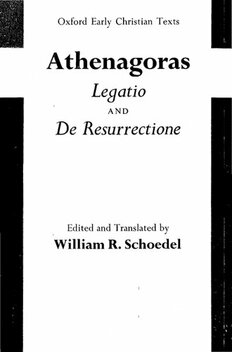Table Of ContentOxford Early Christian Texts
Athenagoras
Legatio
AND
De Resurrectione
Edited and Translated by
William R. Schoedel
General Editor: Dr. Henry Chadwick
Dean of Christ Church, Oxford
The main object of the series is to
provide reliable working texts, with
English translations, of important works
by writers of the patristic period in
both Greek and Latin. There will be no
attempt to make it a complete patro-
logy, only those works being included
for which it is considered there is a
real need in this kind of edition.
Each volume contains an introduc
tion, text and select critical apparatus,
with English translation en face, refer
ences to quotations and allusions, and
brief notes on subject-matter.
ISBN 0 19 826808 4
In the Legatio Athenagoras deals with
the charge of 'atheism' so often levelled
against the early Church in the Roman
Empire. His efforts to re-orient the
social and religious ideasof the Romans
help us to see the situation as many
early Christians must have seen it, and
this makesthework of great importance
to the historian and theologian.
The de Resurrectione is probably not
(despite tradition) from the hand of
Athenagoras. It seems to have emerged
from the Origenist controversies and
stands as an illustration of the way
in which traditional items of faith
were defended in the face of Platonist
metaphysics.
General Editor
DR. HENRY CHADWICK
Dean of Christ Church, Oxford
ATHENAGORAS
ATHENAGORAS
Legatio
AND
D e Resurrectione
EDITED AND TRANSLATED
BY
WILLIAM R. SGHOEDEL
OXFORD
AT THE CLARENDON PRESS
1972
Oxford University Press, Ely House, London W. i
GLASGOW NEW YORK TORONTO MELBOURNE WELLINGTON
CAPE TOWN IBADAN NAIROBI DAR ES SALAAM LUSAKA ADDIS ABABA
DELHI BOMBAY CALCUTTA MADRAS KARACHI LAHORE DACCA
KUALA LUMPUR SINGAPORE HONG KONG TOKYO
© OXFORD UNIVERSITY PRESS 1972
PRINTED IN GREAT BRITAIN
AT THE UNIVERSITY PRESS, OXFORD
BY VIVIAN RIDLER
PRINTER TO THE UNIVERSITY
PREFACE
A lthough Athenagoras is not well known and left no
deep mark on the life and thought of the ancient Church,
the two documents which come down to us under his name
may be read as fragments of larger debates and in this way
contribute significantly to our understanding of two im
portant problems that emerged in the early period.
Athenagoras’ Plea is especially noteworthy for the light
which it sheds on the social problem of Christianity as a
popular religious movement in the Roman Empire. The
author’s careful exploration of the charge of ‘atheism’ sub
ordinates traditional polemics to a controlled apologetic aim
and reveals more clearly than other early discussions some
thing of the underlying difference between Christian and
Graeco-Roman views of ‘piety’. Raffaele Pettazzoni and
others have taught us that the clash between Rome and the
Church was in part a clash between two distinct types of
religion: first, the ancient religion of city and state—that is,
the type of religion which establishes and enshrines the values
of the political and social institutions of this world; and
second, the universal religion with its message of salvation—■
that is, the type of religion which (like Christianity) orients
men to values that transcend the mundane order of things.
Athenagoras knows as certainly as Varro that there is a
‘political religion’ which the emperors welcome for the sake of
social stability. He presents Christianity as superior to such
religion and appeals to an authority greater than that of the
state; but he also emphasizes the loyalty of Christians in
conventional terms. Unfortunately, the underlying tensions
in this marriage of themes and their practical consequences
are not adequately explored. In particular, Athenagoras
fails to realize that the mild ‘atheism’ of a pagan elite—the
philosophers—could not properly be compared with the
thoroughgoing ‘atheism’ of a popular religious movement
such as Christianity. Rome’s tolerance, however broad, had
limits which our apologist cannot fully grasp; consequently,
he neglects the social issues for argumentation (sometimes
superficial and arid) on theological and metaphysical issues.
The weakness of his work, however, should not be exag
gerated as it was by Johannes Geffcken in his searing attack
of 1907. A more balanced view of his achievement is offered
in the introduction to this edition.
The second treatise in this book, On the Resurrection,
apparently comes from another period, despite the tradi
tional ascription of it to Athenagoras. Reasons are presented
in the introduction for viewing it as a conservative reaction
to the teaching on the resurrection in the school of Origen.
Alternatively, because of the close relation both historically
and philosophically between Origen and the later Platonists,
the treatise may be directed against the latter. In any event,
we have before us a polemic which underscores the difficulties
encountered by Christian theology as it attempted to come to
terms more fully with Platonism.
I owe to Robert M. Grant my first interest in the text of
Athenagoras and the problems of his writing on the literary,
intellectual, and social side. Subsequently I have profited
much from conversations with other American scholars,
especially Robert L. Wilken and Lloyd G. Patterson. I wish
also to recognize Brown University of Providence, R.I., for
summer grants which made the writing of this book possible.
The staff of the Clarendon Press has my warmest thanks,
especially for its close attention to detail in the editing of
this volume. Finally, I dedicate this work to my father,
G. Walter Schoedel, who would have been pleased, I think,
with a book of this kind.
W. R. S.
The University of Illinois
Summer igji

